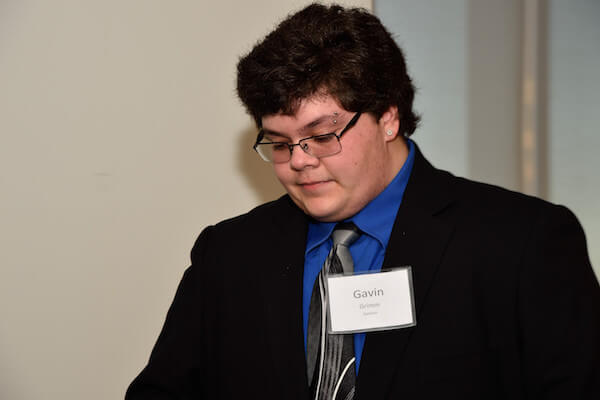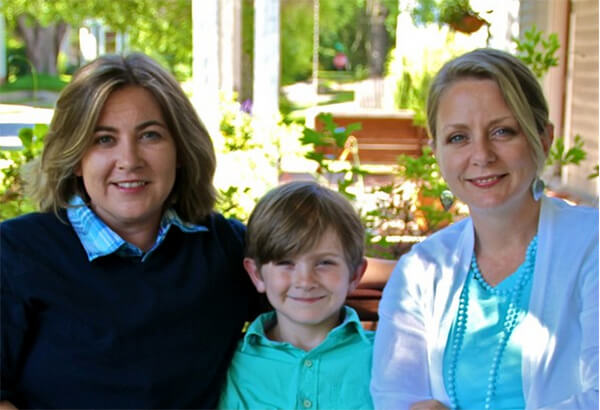Gavin Grimm, speaking at a 2016 ACLU event in New York. | DONNA ACETO
BY ARTHUR S. LEONARD | In the latest turn in the lengthy litigation waged by Gavin Grimm, a transgender teenager who recently graduated from his Virginia high school — to establish the right of students to access bathroom facilities consistent with their gender identity — the American Civil Liberties Union which represents him, has filed an amended complaint that argues his status as an alumnus who might visit the school gives him an ongoing personal stake in the issue.
The litigation, which began more than two years ago, has dramatically raised the visibility of transgender students who are seeking to assert their right to receive equal access to bathroom facilities in their schools, and at one point, Grimm’s case seemed headed for the Supreme Court.
Grimm’s mother, Deirdre, originally filed suit on his behalf against the school board in July 2015 prior to his junior year in a Gloucester County high school. The suit alleged that the school’s policy of requiring students to use restrooms based on their biological sex rather than their gender identity violated Grimm’s right to be free of sex discrimination forbidden under Title IX of the Education Amendments Act of 1972 and the 14th Amendment Equal Protection Clause.
ACLU reframes case, focusing on his status as alumnus with ongoing personal stake
In September of that year, District Judge Robert G. Doumar dismissed Grimm’s Title IX claim, while reserving judgment on the 14th Amendment claim, and denied his motion for a preliminary injunction allowing him to use the boys’ bathroom and locker room while the case proceeded. With the case before Doumar, the Obama administration’s Departments of Education and Justice filed a joint statement with the court supporting Grimm’s Title IX claim.
In April of 2016, the Fourth Circuit Court of Appeals focused on that statement from the federal agencies, finding that Doumar should have deferred to their interpretation of the Title IX regulations, concluding it was reasonable. The Fourth Circuit panel reversed Judge Doumar’s dismissal of the Title IX claim, and sent the case back to him to reconsider Grimm’s request for a preliminary injunction.
Shortly after that, the Obama administration issued a “Dear Colleague” letter to all the nation’s public schools receiving federal funds, more formally stating the position on Title IX it had earlier conveyed in Grimm’s case. In June of last year, Doumar issued the preliminary injunction Grimm had sought nearly a year before. Unfortunately for Grimm in his upcoming final high school year, the Supreme Court granted Gloucester County a stay of Doumar’s injunction while the school district prepared to file for high court review. So, during his final school year, Grimm was still barred from using the boys’ bathrooms.
The Supreme Court scheduled oral argument in the Grimm case for March 28 of this year, but after Attorney General Jeff Sessions and Education Secretary Betsy DeVos withdrew the Obama administration interpretation of Title IX, the high court canceled that argument. The case was sent back to the Fourth Circuit to address the merits of Grimm’s appeal under Title IX, absent any Executive Branch guidance on the issue.
After the Fourth Circuit tentatively scheduled argument for this month, the school district argued the case had become moot because Grimm had graduated. But Grimm responded that his possible “future attendance at alumni and school-community events” at the high school gave him a continuing concrete interest in the injunction he sought, especially given the school’s “noncommittal statement” about whether its restrictive policy applied to alumni.
Under Supreme Court precedents, the court does not have jurisdiction in the lawsuit unless there is an “actual case or controversy” between the parties, so Grimm must show a concrete interest in the outcome, which would mean that the policy he is challenging actually affects him personally. The Fourth Circuit decided it did not have the factual basis to answer this question, so it referred the case back to Doumar for additional fact-finding.
Litigating over the issue of mootness regarding a preliminary injunction did not strike the ACLU as the best approach at this point in the litigation, so it secured agreement from the school district to seek dismissal of Grimm’s appeal at the Fourth Circuit, which it granted in mid-August. The ACLU, meanwhile, proceeded to file an amended complaint.
The new complaint supplements the original complaint and argues, “As an alumnus with close ties to the community, Gavin will continue to be on school grounds when attending football games, alumni activities, or social events with friends who are still in high school.” This would support his continuing personal stake in the issue of appropriate restroom access at the school. The complaint reiterates the claim that Grimm’s case rests on both the 14th Amendment and Title IX. The relief Grimm is seeking is a declaration that the school’s policy is illegal, nominal damages symbolic of the injury done to him by denying him appropriate restroom access, a permanent injunction allowing Grimm to use the same restrooms as “other male alumni,” reasonable litigation costs and attorneys’ fees, and “such other relief as the Court deems just and proper.”
The school board can be expected to move to dismiss the amended complaint with the argument it made earlier that the case was moot, but this time the standing question will be litigated solely with respect to Grimm’s alumni status going forward.
The case now appears to be assigned to District Judge Arenda L. Wright Allen, who was appointed by President Barack Obama in 2011 and issued a pro-marriage equality decision in 2014. Judge Doumar, 87, who issued the earlier rulings for the district court in Grimm’s case, is a senior judge appointed by Ronald Reagan in 1981.
The recent Chicago-based Seventh Circuit Court of Appeals ruling in favor of Ash Whitaker, a trans student seeking to use the boys’ bathroom in his Kenosha, Wisconsin, high school is being appealed to the Supreme Court. If the Whitaker case is accepted by the high court, it is likely that Grimm’s case will be put on hold pending what could prove to be the definitive say on the matter.





































